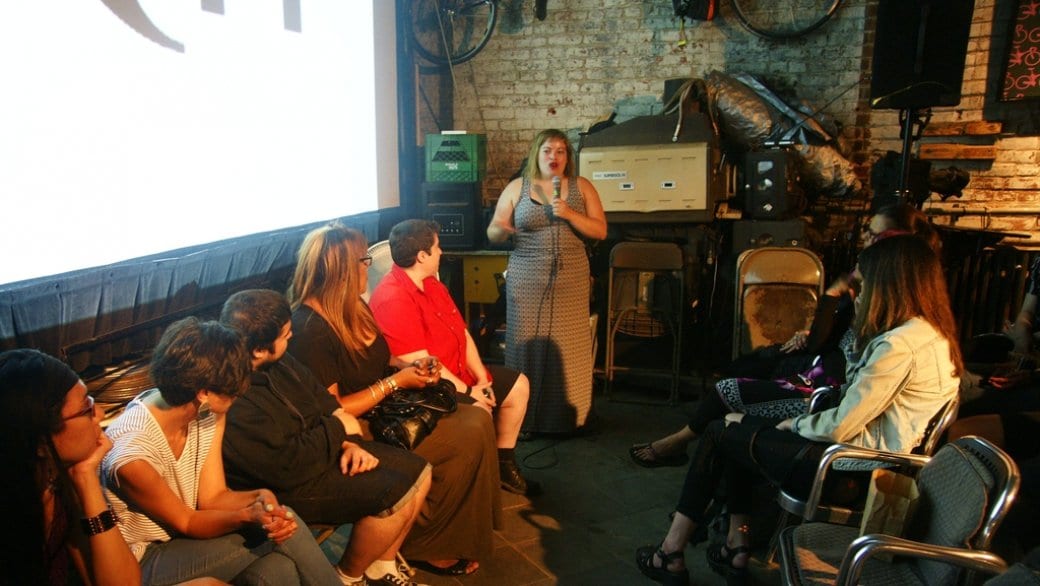When Kami Chisholm announced the first edition of Toronto Queer Film Festival in 2016, no one — including her — was really sure how it was going to go. Was there an appetite for an event that screened queer and activist short films during Pride? Was it possible to do the entire thing without any government or corporate support? Could it become an annual event?
The answer seems to be a resounding “Yes.” This June, TQFF returns with an expanded program and a venue more than twice the size of last year’s. It also raised more than $10,000 to cover production costs and artist fees through crowd-funding. The crew has also swelled to include a programming posse of seven, plus additional folks to help out with social media, marketing and postering.
So has increasing the size of the team made it easier or harder to get things done?
Chisholm says it’s a bit of both.
“We’re really open to everyone’s perspective and we try to talk as a group and operate by consensus, but with very firm grounding principles,” she says. “What’s not up for debate is the mandate to show boundary-pushing queer and trans film and video that isn’t getting screened elsewhere, and our political and cultural stake in this. We invite people to join on that basis, and once they’re part of the group, everyone has their say.”
June is a tough time to present events in Toronto — there’s already so much going on that new projects can struggle to get attention amid the glut of rainbow-drenched activities on offer. But despite the overwhelming number of entertainment options, TQFF has secured an audience by providing something that’s still rare during the month long celebration — an art event that connects with Pride’s activist roots.
Though the festival is clearly filling an important void within Toronto’s queer community, it started from a very personal need.
“I always used to get really depressed around the beginning of June,” Chisholm says. “It’s supposed to be this time to go out with friends and participate in culture and activism. But I just wasn’t finding things I wanted to go to. It was like being a queer at Christmas with no family to go home to.”
Finding Pride oversaturated with corporate interests and lacking in real politics (a subject she discusses at length in her documentary, Pride Denied), Chisholm decided to create the kind of space that she wanted to be in.
“You could think of the film as a critique of this move by Pride away from its activist roots and the festival as my affirmative answer to what we really should be doing,” she says.
This year’s program includes eight screenings, primarily shorter works with a few longer things mixed in. The opening night includes a program of refugee and migrant-focused films. Along with that, there are two porn programs. (“Some are straight up porn, others are porn-adjacent,” Chisholm says.) Also on offer are a few films addressing sex work, including a rare screening of Janis Cole and Holly Dale’s 1984 film Hookers on Davie, a look at women working on Vancouver’s lower east side. The fest also includes a workshop for women and trans folk new to filmmaking.
Though it’s only celebrating its first birthday, the organizers already have ambitious plans for expanded programming and educational initiatives geared especially towards emerging artists.
“We’re looking for ways we can provide this cultural and activist space that we think is appropriate for Pride on an ongoing basis,” Chisholm says. “An annual festival in June is great. But providing access to these kinds of films for audiences and offering a platform to artists making them is something we want to be able to do throughout the year.”
When TQFF was announced last year, Chisholm was clear that she had a bone to pick with larger gay non-profits like Pride Toronto and Inside Out. She felt they had lost their way, becoming too concerned with increasing revenue through corporate donations to allow for expansion. (She was also an active participant at the Pride Toronto AGM in January 2017, when the board voted in all of Black Lives Matter Toronto’s demands.)
Though TQFF is highly activist in nature, Chisholm stresses it shouldn’t be considered revolutionary.
“We’re just trying to create a space where people can be queer and fabulous and watch films and dance with their friends,” she says. “In that way, what we’re doing isn’t really radical or even new. This is what Pride and Inside Out used to be, so we want to create those kinds of spaces again because the need for them has not gone away in the last 30 years. If anything, it’s even stronger.”


 Why you can trust Xtra
Why you can trust Xtra


